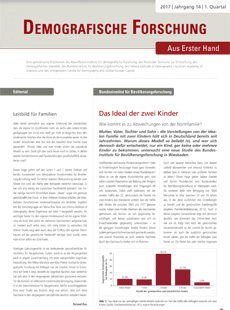April 04, 2017 | Defo News
The two-child ideal

Issue 01/2017 © MPIDR
The new issue (Nr. 1/2017) of Demografische Forschung Aus Erster Hand, the popular science newsletter with latest research results from demography, has been released. (The Newsletter is available in German only.)
Topics of the 1/2017 issue:
1. The two-child ideal
How does it come to deviations from the family of standard size?
Mother, father, daughter, and son – the notion of the two-child family ideal has been persisting in Germany for decades. A new study from the Federal Institute for Population Research in Wiesbaden investigates why this model is so popular and who the people are that decide to go for one child, none at all, or many all the same.
2. From mother to mother
How the education of women affects the prospect of having grandchildren
The well-educated have fewer children than their less-educated counterparts, and this is known from many countries. But a new study from the Vienna Institute of Demography now shows that highly-educated women on average desire to have at least as many children as those who have received little in the way of education. High educational attainment of the grannies-to-be has a positive impact on the desire for children, too.
3. Better prospects for delicate babies
Cognitive disadvantages from low birth weight have shrunk significantly
When children have a birth-weight lower than 2500 grams, their parents often fear disadvantages for their babies in later life. And many studies have already demonstrated that these children’s cognitive abilities are generally lower than those of their normal-birth-weight peers. A new study from Rostock now shows that these disadvantages have shrunk significantly over the past decades.
"Demografische Forschung Aus Erster Hand" is a joint publication of the Max Planck Institute for Demographic Research (MPIDR), the Rostocker Zentrum zur Erforschung des Demografischen Wandels (RZ), the Vienna Institute of Demography (VID), the Wittgenstein Centre for Demography and Global Human Capital and the Federal Institute for Population Research (BiB). The newsletter is released four times a year and is available electronically and as a printed version and is free of charge.
All past issues are available online on the Newsletter website. On the website you also have the possibility to subscribe to the Newsletter to get informed about the release of the new issues or to receive the printed versions by mail.